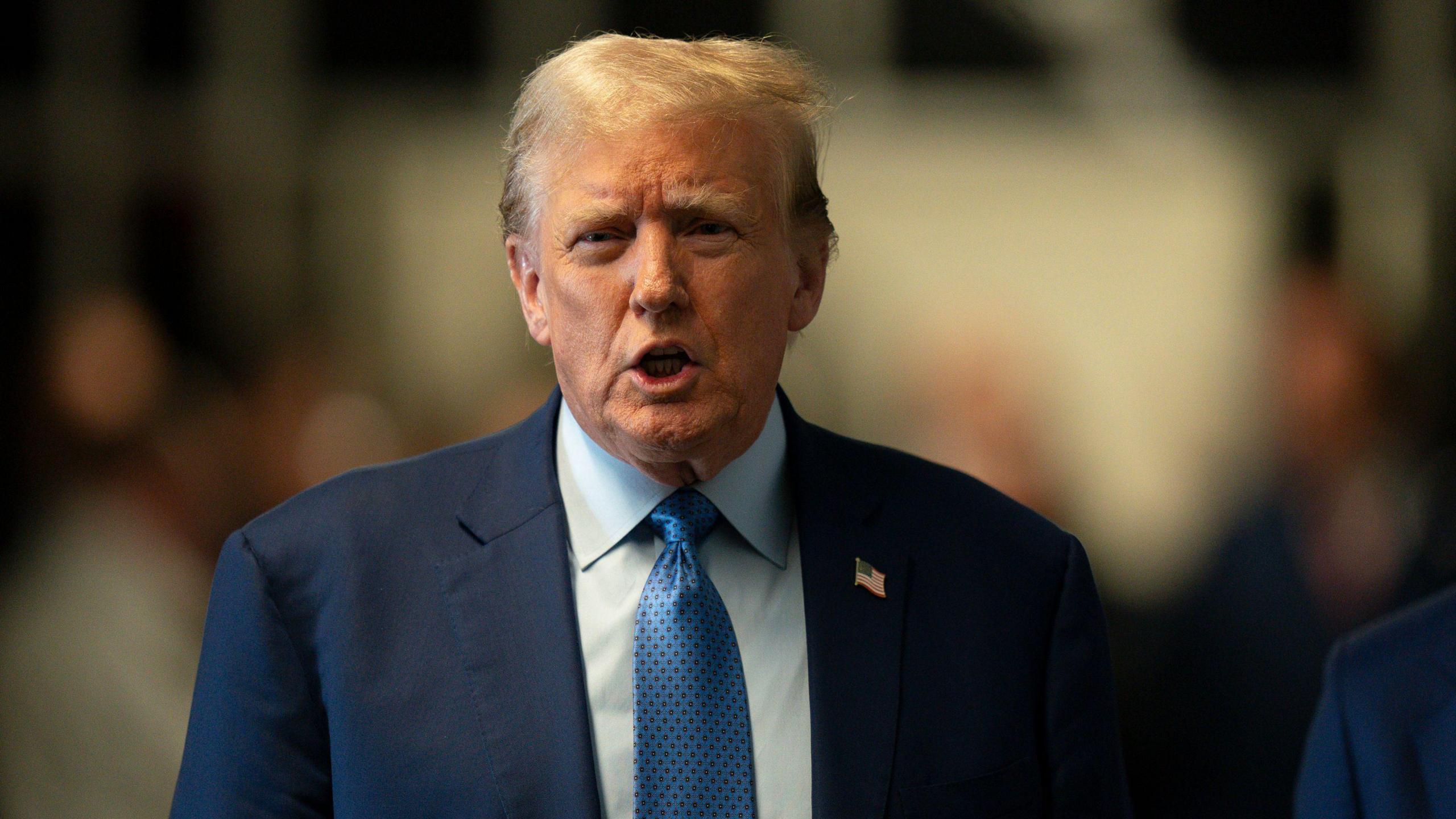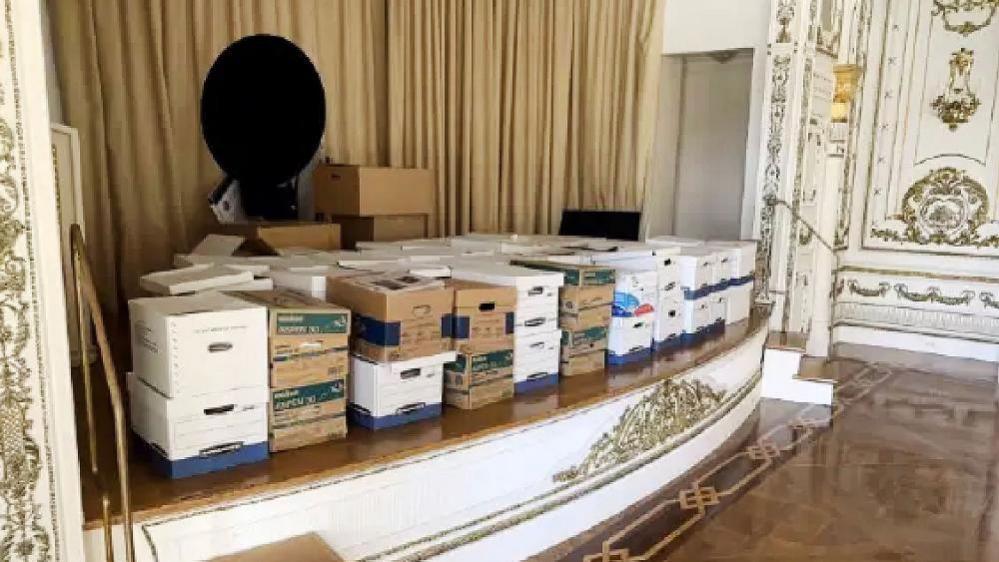Trump classified documents case dismissed by Florida judge

- Published
A Florida judge has dismissed the US justice department's classified documents case against Donald Trump in a huge victory for the former president just days after a gunman attempted to assassinate him.
Judge Aileen Cannon granted Mr Trump's motion to dismiss the federal case on the basis that the justice department's appointment of special prosecutor Jack Smith violates the Appointments Clause of the US Constitution.
He pleaded not guilty to several charges in the case over his handling of classified documents, including wilful retention of national defence information.
A spokesman for Mr Smith said that the justice department has authorised an appeal.
Dozens of classified files were found in Mr Trump's Mar-a-Lago resort in Florida, including in a shower and storage room, after he left the White House in 2021.
"The Court is convinced that Special Counsel’s Smith’s prosecution of this action breaches two structural cornerstones of our constitutional scheme—the role of Congress in the appointment of constitutional officers, and the role of Congress in authorizing expenditures by law,” Judge Cannon concluded in her 93-page order, external.
The former president faced multiple felony counts over his alleged mishandling of classified documents.
The 37-count indictment accused Mr Trump of keeping files at his Florida estate and lying to investigators. It alleged he then tried to obstruct the investigation into the handling of the documents.
He was charged alongside aide Walt Nauta and former employee Carlos de Oliveira, who had also pleaded not guilty.
Attorney General Merrick Garland appointed Mr Smith in 2022 to oversee two federal investigations into the former president.
Judge Cannon said in her ruling that this decision applies to this case and not a second one overseen by Mr Smith over alleged efforts to overturn the 2020 election.
The former president's lawyers did not make a similar request to dismiss that case.
The Trump-appointed Florida judge had recently indefinitely postponed the federal classified documents trial, saying there were significant questions over trial evidence.
Legal experts have debated the strengths and weakness of the two federal criminal cases brought by Mr Smith.
On Monday, Judge Cannon stepped in and said those details did not matter.
She held that the mere existence of special counsels - how they are appointed and how they are funded - violates the US Constitution.
Judge Cannon's ruling cuts against the ruling of judges in other US courts that have dealt with these specially appointed prosecutors.
It draws from theories advanced by some conservative legal scholars and, most notably, by Supreme Court Justice Clarence Thomas in the top court's recently decided presidential immunity case.
In that case, the Supreme Court said former presidents, including Mr Trump, are immune from criminal prosecution for "official acts".
Judge Cannon cited three times in her decision a concurring opinion by Justice Thomas in the Supreme Court ruling in which he questioned whether there was a legal basis for naming special counsel.

The indictment included images of files allegedly stored in a shower at Donald Trump's Florida property, Mar-a-Lago
Nikki Haley to give speech - what to expect at Republican convention
- Published18 July 2024
The man who could bring down Donald Trump
- Published15 July 2024
Former federal prosecutor Neama Rahmani told the BBC on Monday that Judge Cannon's ruling was "stunning, to say the least".
While Judge Cannon said her ruling was limited to this case, Mr Rahmani said it casts doubt on the appointment of special counsels in other cases.
That includes the case of Hunter Biden - President Joe Biden's son - who was investigated by a special counsel and convicted on gun charges last month.
But a key difference is that the special counsel in that case, David Weiss, is a US attorney for Delaware who, unlike Mr Smith, was nominated by the president and confirmed by the Senate.
As well has having the right to an appeal, Mr Smith can also ask for a new judge to be assigned to the case.
Mr Smith's spokesman said: "The dismissal of the case deviates from the uniform conclusion of all previous courts to have considered the issue that the Attorney General is statutorily authorized to appoint a Special Counsel.
"The Justice Department has authorized the Special Counsel to appeal the court’s order."
Legal experts say Judge Cannon's ruling is likely to be overturned but that the further delay to the case could prove beneficial to Mr Trump's campaign.
"Her ruling has no chance of being sustained on appeal as it conflicts with decisions of the Supreme Court and other lower courts, but it will have the effect of preventing any more embarrassing revelations before the election," said David Super, a professor at Georgetown University Law Center.
Judge Cannon's decision also comes as Republicans gather in Milwaukee, Wisconsin, for the Republican National Convention, where Mr Trump will accept the party's nomination for president.
The US election is on 5 November.
On Monday, Mr Trump said on his social media site that the dismissal of the case "should be just the first step, followed quickly by the dismissal of ALL the Witch Hunts".
"Let us come together to END all Weaponization of our Justice System, and Make America Great Again!"
While many Republican lawmakers cheered the decision, Senate Majority Leader Chuck Schumer, a Democrat, described the dismissal as a "breathtakingly misguided ruling".
In May, Mr Trump was found guilty of falsifying business records in a New York hush-money case. He is due to be sentenced in September.
He has also been charged with four criminal counts, including conspiracy to defraud the US and conspiracy against the rights of citizens, in the 2020 election case.
Mr Trump and some 18 other defendants are also accused of criminally conspiring to overturn his very narrow defeat in the state of Georgia in the 2020 election in a separate case.
He has denied any wrongdoing.